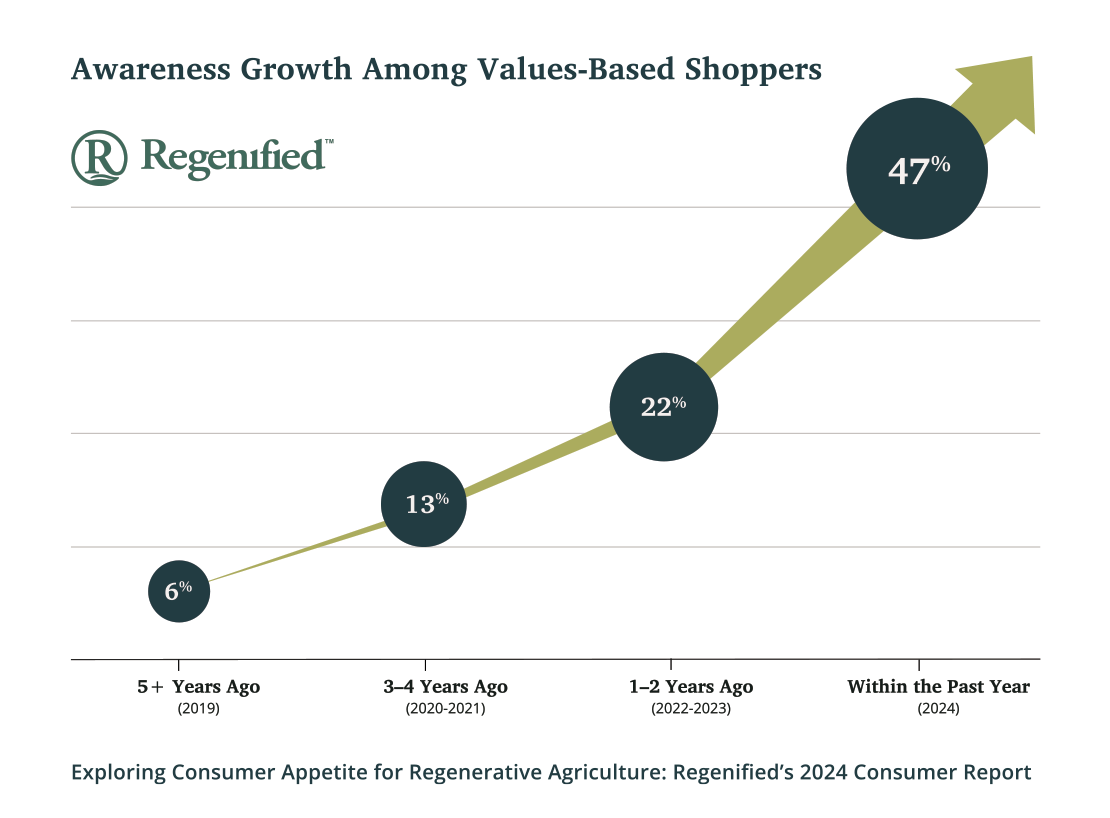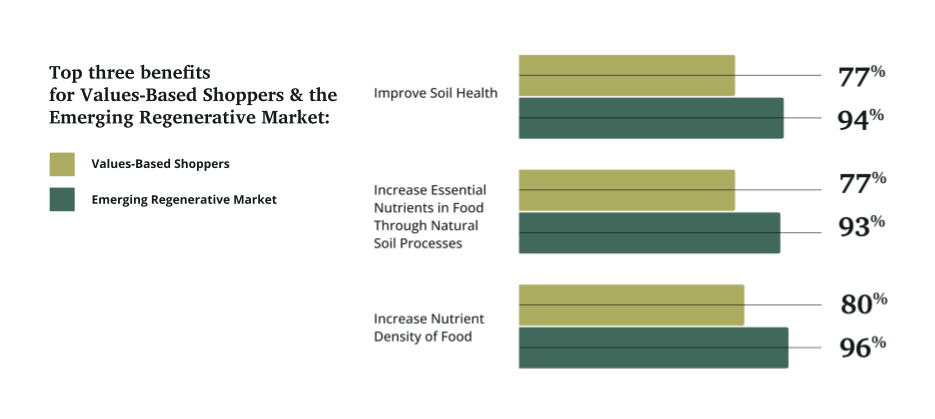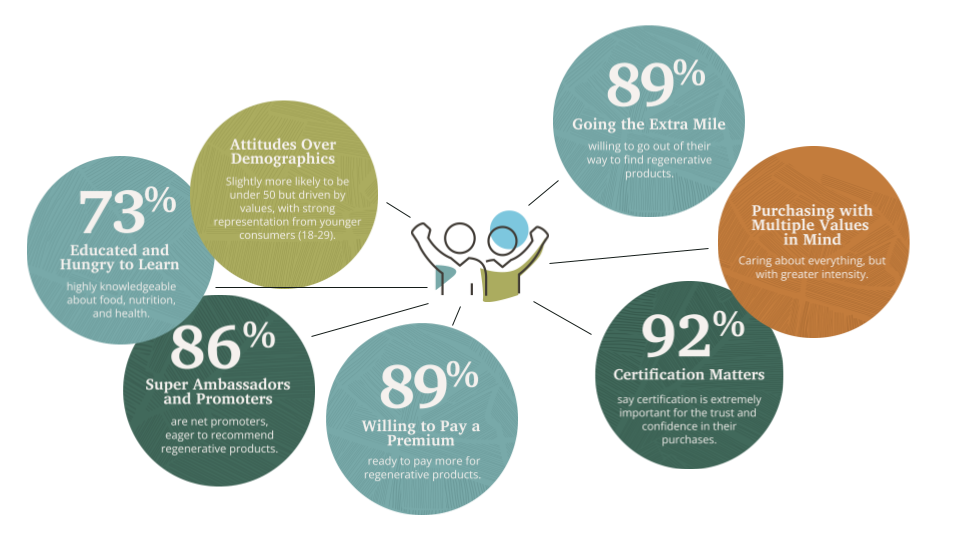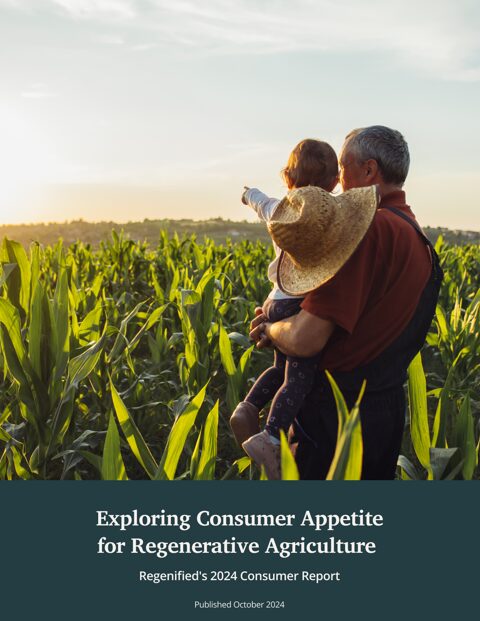
Exploring Consumer Appetite for Regenerative Agriculture: Insights from Regenified’s 2024 Consumer Report
In recent years, encouraging signs for the future of soil health have emerged, from increased adoption of regenerative practices to expanding market access for regenerative products to innovative collaborations across the supply chain. Yet a critical dependency for creating long-term ecological and economic impact through regenerative agriculture deserves close inspection—consumer interest. What do we know about consumers’ understanding and motivations concerning regenerative agriculture today?
To find out, Regenified commissioned an in-depth study to establish key benchmarks on current consumer awareness, interest, and purchase intent, surveying 850 U.S. consumers on questions related to their food shopping criteria and regenerative agriculture. Exploring Consumer Appetite for Regenerative Agriculture: Regenified's 2024 Consumer Report, looks at both General Consumers and Values-Based Shoppers, examining current awareness of regenerative agriculture, what’s driving consumer choices, and the behaviors influencing market trends. Among the key findings, we observed an intriguing subset of consumers spanning both groups—dubbed the Emerging Regenerative Market—appearing to have significant interest in regenerative values and a desire to purchase regenerative products.
Read on to see a few of the highlights which are detailed further in the full report.
Growing awareness, but understanding is limited
Awareness of regenerative agriculture has grown steadily in the last five years, but recently, it has surged—nearly half of respondents indicated they became familiar with the term within the last year.

However, more education about what regenerative agriculture really means and how it impacts their food choices is needed. The study found that while 68% of Values-Based Shoppers have heard of regenerative agriculture, only 37% claim to understand it.
Nearly three-quarters of Values-Based Shoppers are seeking trusted information, presenting a wide-open opportunity for brands and retailers to offer clear, credible information that earns them a position as trusted leaders in this growing space.
Consumers are willing to pay more for regenerative (if they can find it)
The survey results indicate that 56% of Values-Based Shoppers and 89% of the Emerging Regenerative Market will pay a premium for regenerative products. Both groups (40% and 44%, respectively) cite availability as a barrier to purchasing them.
Consumers reported that regenerative products are either unavailable in their area, or not found in the stores where they shop: representing a significant missed opportunity for brands and retailers. Values-Based Shoppers are especially interested in supporting regenerative agriculture across core product categories such as fruits and vegetables (83%), eggs (60%), dairy (56%), meat (52%), and grains (48%).
Certification and Nutrient Density are two important drivers for adoption
Trust stood out as a critical factor in consumer decision-making, particularly for regenerative products. The data shows that certification plays a key role in building trust, with 72% of Values-Based Shoppers indicating that certification is "extremely important" when making purchasing decisions. Among the Emerging Regenerative Market, this rises to 92%, highlighting their strong demand for clear, credible labeling to ensure confidence in the products they choose.

For Values-Based Shoppers, "increased nutrient density" emerged as a key benefit, with 80% identifying it as a significant factor in purchasing decisions. For the Emerging Regenerative Market, this figure climbs even higher to 96%—it appears to represent an environmental choice that aligns with their desire for better food.
Meet the “the Emerging Regenerative Market”
The study revealed a new archetype for retailers to understand: the Emerging Regenerative Market, accounting for 20% of the general population and 37% of Value-Based Shoppers.

Data from the Emerging Regenerative Market: Regenified's 2024 Consumer Report
Emerging as a distinct subset from both Values-Based Shoppers and General Consumers based on their heightened interest and engagement with regenerative agriculture, this group was identified through several key data points:
- 73% of the Emerging Regenerative Market are highly knowledgeable about food, nutrition, and health and eager to continue learning about the products they consume.
- 86% of the Emerging Regenerative Market are promoters, highly likely to recommend regenerative products to others, making them loyal advocates for the movement.
- 89% of the Emerging Regenerative Market are willing to go out of their way to find regenerative products, demonstrating their commitment to supporting the regenerative agriculture movement.
- 89% of the Emerging Regenerative Market are ready to pay more for regenerative agriculture products, showing their strong belief in the value these products bring.
- The Emerging Regenerative Market are more likely to seek products with multiple value-based claims—reflecting commitment to aligning their choices with broader ethical and health values.
These individuals are defined not only by their heightened awareness of food, health, and environmental issues but also by their deep-rooted commitment to aligning purchasing decisions with ethical and environmental values. What sets the Emerging Regenerative Market apart is their influence as advocates for the regenerative movement. These consumers are not just purchasers; they are vocal supporters of the products and brands they believe in. Through their recommendations, the Emerging Regenerative Market helps raise awareness of regenerative agriculture, serving as ambassadors for a more resilient food system.
Why you should read the full report: Bridging the knowledge gap
While many of the data points in this study align with prior studies on consumer values—it reveals a unique perspective on the linkages between trusted information, consumer interest, and alignment with deeply held personal values.
The data shows that while awareness of regenerative agriculture is increasing, a smaller percentage of consumers fully understand the concept on their own. However, understanding rises sharply when information is shared that connects regenerative practices to values such as human health, nutrient density, and environmental impact. By better understanding the concerns, drivers and perceptions of key constituencies—in particular the Emerging Regenerative Market—growers, brands, and supply chain partners can tap into a subset of consumers that appear ripe for nurture and growth.




